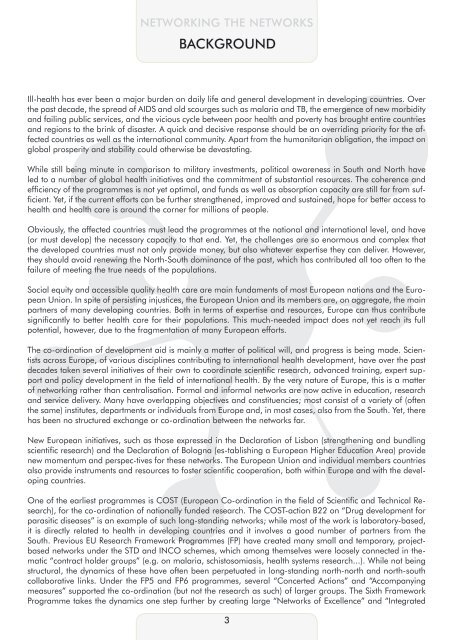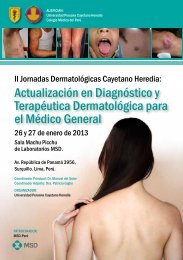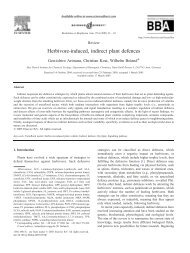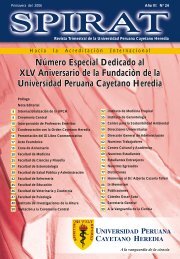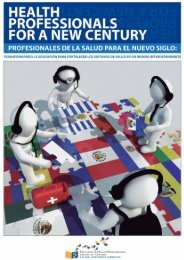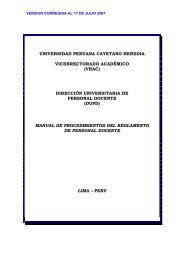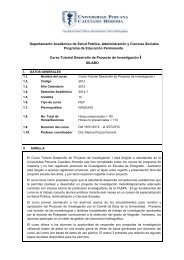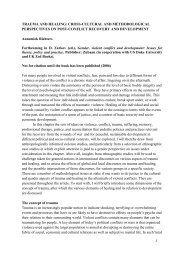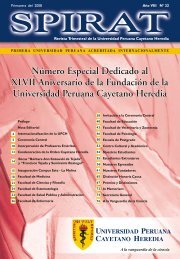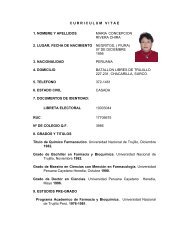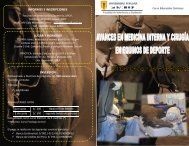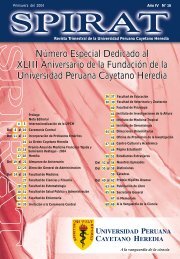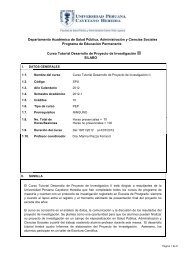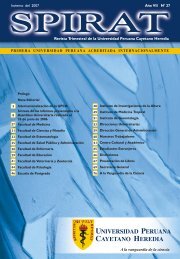NETWORKING THE NETWORKS - UPCH
NETWORKING THE NETWORKS - UPCH
NETWORKING THE NETWORKS - UPCH
Create successful ePaper yourself
Turn your PDF publications into a flip-book with our unique Google optimized e-Paper software.
<strong>NETWORKING</strong> <strong>THE</strong> <strong>NETWORKS</strong><br />
BACKGROUND<br />
Ill-health has ever been a major burden on daily life and general development in developing countries. Over<br />
the past decade, the spread of AIDS and old scourges such as malaria and TB, the emergence of new morbidity<br />
and failing public services, and the vicious cycle between poor health and poverty has brought entire countries<br />
and regions to the brink of disaster. A quick and decisive response should be an overriding priority for the affected<br />
countries as well as the international community. Apart from the humanitarian obligation, the impact on<br />
global prosperity and stability could otherwise be devastating.<br />
While still being minute in comparison to military investments, political awareness in South and North have<br />
led to a number of global health initiatives and the commitment of substantial resources. The coherence and<br />
efficiency of the programmes is not yet optimal, and funds as well as absorption capacity are still far from sufficient.<br />
Yet, if the current efforts can be further strengthened, improved and sustained, hope for better access to<br />
health and health care is around the corner for millions of people.<br />
Obviously, the affected countries must lead the programmes at the national and international level, and have<br />
(or must develop) the necessary capacity to that end. Yet, the challenges are so enormous and complex that<br />
the developed countries must not only provide money, but also whatever expertise they can deliver. However,<br />
they should avoid renewing the North-South dominance of the past, which has contributed all too often to the<br />
failure of meeting the true needs of the populations.<br />
Social equity and accessible quality health care are main fundaments of most European nations and the European<br />
Union. In spite of persisting injustices, the European Union and its members are, on aggregate, the main<br />
partners of many developing countries. Both in terms of expertise and resources, Europe can thus contribute<br />
significantly to better health care for their populations. This much-needed impact does not yet reach its full<br />
potential, however, due to the fragmentation of many European efforts.<br />
The co-ordination of development aid is mainly a matter of political will, and progress is being made. Scientists<br />
across Europe, of various disciplines contributing to international health development, have over the past<br />
decades taken several initiatives of their own to coordinate scientific research, advanced training, expert support<br />
and policy development in the field of international health. By the very nature of Europe, this is a matter<br />
of networking rather than centralisation. Formal and informal networks are now active in education, research<br />
and service delivery. Many have overlapping objectives and constituencies; most consist of a variety of (often<br />
the same) institutes, departments or individuals from Europe and, in most cases, also from the South. Yet, there<br />
has been no structured exchange or co-ordination between the networks far.<br />
New European initiatives, such as those expressed in the Declaration of Lisbon (strengthening and bundling<br />
scientific research) and the Declaration of Bologna (es-tablishing a European Higher Education Area) provide<br />
new momentum and perspec-tives for these networks. The European Union and individual members countries<br />
also provide instruments and resources to foster scientific cooperation, both within Europe and with the developing<br />
countries.<br />
One of the earliest programmes is COST (European Co-ordination in the field of Scientific and Technical Research),<br />
for the co-ordination of nationally funded research. The COST-action B22 on “Drug development for<br />
parasitic diseases” is an example of such long-standing networks; while most of the work is laboratory-based,<br />
it is directly related to health in developing countries and it involves a good number of partners from the<br />
South. Previous EU Research Framework Programmes (FP) have created many small and temporary, projectbased<br />
networks under the STD and INCO schemes, which among themselves were loosely connected in thematic<br />
“contract holder groups” (e.g. on malaria, schistosomiasis, health systems research...). While not being<br />
structural, the dynamics of these have often been perpetuated in long-standing north-north and north-south<br />
collaborative links. Under the FP5 and FP6 programmes, several “Concerted Actions” and “Accompanying<br />
measures” supported the co-ordination (but not the research as such) of larger groups. The Sixth Framework<br />
Programme takes the dynamics one step further by creating large “Networks of Excellence” and “Integrated<br />
3


